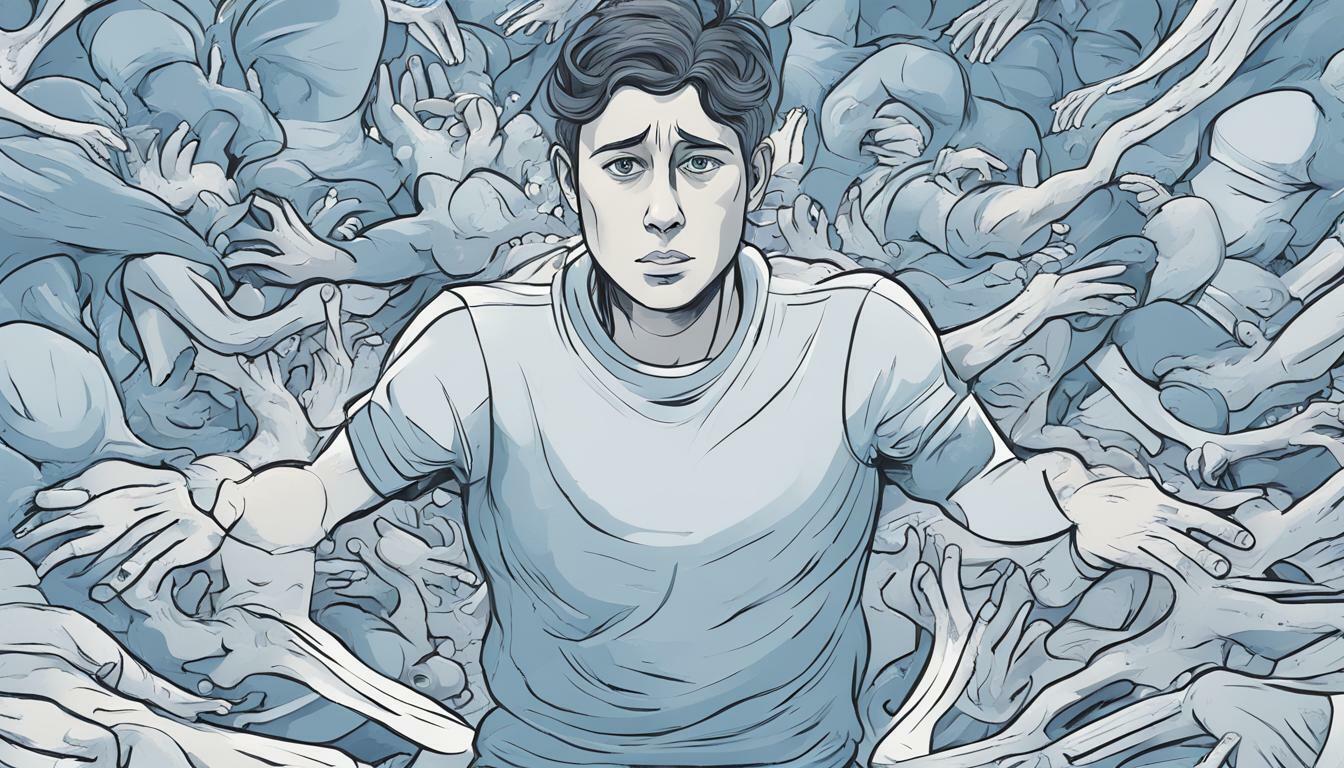Do you find yourself constantly worrying or feeling tense? Do you frequently experience physical symptoms like muscle tension or heart palpitations? These may be signs that you have anxiety.
Anxiety is a common mental health condition that affects millions of people worldwide. It can manifest in different ways and impact various aspects of your life, from work and relationships to physical health and overall well-being.
Identifying the signs of anxiety is the first step towards managing this condition effectively and improving your quality of life. In this article, we will explore the five most common signs of anxiety and provide tips for managing it.
Key Takeaways
- Anxiety is a common mental health condition that can manifest in various ways.
- Identifying the signs of anxiety is crucial for managing it effectively.
- The five most common signs of anxiety are excessive worry and fear, physical symptoms, avoidance behavior, changes in sleep patterns, and social withdrawal.
- Managing anxiety involves seeking professional help, adopting healthy coping strategies, and making lifestyle changes.
Anxiety Overview
At some point in our lives, we all experience feelings of worry and fear that can be overwhelming. However, when these emotions become persistent and interfere with daily activities, they may be a sign of anxiety. Anxiety is a common mental health condition that affects millions of people worldwide, with different forms and levels of severity.
At its core, anxiety is characterized by a sense of unease, nervousness or apprehension about a perceived threat or danger, even if it is not tangible or imminent. Anxiety can manifest in various ways, including physical symptoms, negative thoughts, and behavioral changes that can significantly impact one’s quality of life.
While the exact causes of anxiety are not fully understood, experts suggest that a combination of genetic, environmental, and lifestyle factors can contribute to its development. Some common triggers of anxiety include stress, trauma, medical conditions, and substance abuse, among others.
Living with anxiety can be challenging and often requires a multi-faceted approach to manage symptoms effectively. Treatment options for anxiety vary depending on the severity and underlying causes of the condition, but may include psychotherapy, medication, lifestyle changes, and self-help strategies.
Types of Anxiety
There are several types of anxiety disorders, each with unique characteristics and symptoms:
- Generalized Anxiety Disorder (GAD): Persistent and excessive worry and fear about various aspects of life, such as work, relationships, and health.
- Panic Disorder: Recurrent panic attacks characterized by sudden and intense fear, accompanied by physical symptoms such as chest pain and shortness of breath.
- Social Anxiety Disorder: Fear and avoidance of social situations and interactions due to the fear of being judged or embarrassed.
- Obsessive-Compulsive Disorder (OCD): Intrusive, obsessive thoughts or compulsive behaviors that interfere with daily activities.
- Post-Traumatic Stress Disorder (PTSD): Anxiety symptoms that develop after a traumatic event, such as a natural disaster, war, or physical assault.
It is important to note that anxiety disorders can coexist with other mental health conditions, such as depression and substance abuse, which can complicate treatment and management.
Sign 1: Excessive Worry and Fear
It’s perfectly normal to feel anxious occasionally, but if you find yourself experiencing persistent and intense worry and fear, that may be a sign of anxiety. Excessive worry and fear are the most common symptoms of anxiety disorders and can affect your daily life, causing you to feel overwhelmed and stressed.
You may worry about everything from your health, personal relationships, work, and finances for no apparent reason. You may also have trouble controlling your worry, and it may escalate to anxiety attacks.
Fear is another common symptom of anxiety disorders. You may feel scared or frightened, even if there is no real danger present in your environment. The fear may become so intense that it leads to panic attacks, which can cause physical symptoms like sweating, trembling, or difficulty breathing.
If you identify any of these excessive worries and fears, it is essential to seek professional help to manage your anxiety better before it gets out of hand.
Sign 1: Excessive Worry and Fear
Sign 2: Physical Symptoms
Physical symptoms are a common sign of anxiety. When we feel anxious, our body sends signals to alert us to the threat we perceive. These sensations are the result of physiological changes that occur in response to stress, such as the release of hormones like adrenaline and cortisol.
In some cases, the physical symptoms of anxiety can be so severe that they mimic serious health conditions. Symptoms may include:
| Physical Symptoms of Anxiety |
|---|
| Difficulty breathing or shortness of breath |
| Muscle tension or muscle aches |
| Fatigue and weakness |
| Trembling or shaking |
| Heart palpitations or chest pain |
| Stomach problems like nausea, vomiting, or diarrhea |
| Headaches or migraines |
It’s important to remember that these symptoms do not necessarily indicate a serious medical condition. Instead, they may be signs of anxiety. If you experience physical symptoms that you believe may be related to anxiety, it’s essential to speak with your healthcare provider to rule out any underlying health issues.
Managing physical symptoms of anxiety can involve several strategies, including relaxation techniques like deep breathing and progressive muscle relaxation, exercise, and practicing good sleep hygiene. Additionally, seeking support from a mental health professional can help you develop an individualized treatment plan to manage your symptoms effectively.
Sign 3: Avoidance Behavior
When we feel anxious, our natural instinct may be to avoid the source of our distress. While this may provide temporary relief, it can actually make our anxiety worse in the long run. Avoidance behavior can take many forms, from canceling plans with friends to avoiding tasks at work.
It’s important to recognize when we are engaging in avoidance behavior and to challenge ourselves to face our fears instead. This may mean seeking professional help or support from loved ones.
Some healthy coping strategies for managing avoidance behavior include:
- Breaking tasks into smaller, manageable steps
- Practicing relaxation techniques, such as deep breathing or meditation
- Gradually exposing ourselves to the situations we fear, with professional guidance if needed
By facing our fears and learning to manage them effectively, we can reduce our anxiety and improve our overall well-being.
Sign 4: Changes in Sleep Patterns
Sleep plays a critical role in our physical and mental health, allowing our bodies to rest, repair, and recharge. When we experience anxiety, however, our sleep patterns can be disrupted, making it difficult to fall asleep, stay asleep, or achieve a restful sleep. This can lead to daytime fatigue, mood swings, and difficulty concentrating.
The connection between anxiety and sleep disturbances is complex and bidirectional. On the one hand, anxiety can interfere with sleep by triggering racing thoughts, worries, and physical discomfort. On the other hand, lack of sleep can increase anxiety symptoms by reducing our ability to cope with stress and regulating our emotions.
If you are experiencing changes in your sleep patterns, it is crucial to address them as potential signs of anxiety. Some common sleep-related symptoms of anxiety include:
| Symptom | Description |
|---|---|
| Insomnia | Difficulty falling asleep or staying asleep, waking up too early |
| Nightmares | Frequent or disturbing dreams that cause fear, anxiety, or distress |
| Excessive sleep | Sleeping more than usual, feeling tired and lethargic during the day |
| Restlessness | Tossing and turning in bed, feeling agitated or tense |
If you are struggling with sleep disturbances, there are several strategies you can try to manage anxiety:
- Establish a sleep routine: Go to bed and wake up at the same time every day, even on weekends. Create a relaxing bedtime routine, such as reading, listening to music, or taking a warm bath.
- Avoid caffeine and alcohol: These substances can interfere with sleep and exacerbate anxiety symptoms. Try to limit or avoid them, especially in the evening.
- Exercise regularly: Physical activity can help reduce stress and promote relaxation. Aim for at least 30 minutes of moderate exercise per day, such as walking, cycling, or swimming.
- Practice relaxation techniques: Techniques such as deep breathing, progressive muscle relaxation, or meditation can help calm your mind and body and prepare you for sleep.
If your sleep disturbances persist despite these interventions, it may be helpful to seek professional help from a mental health practitioner or sleep specialist. They can assess your symptoms, identify underlying causes, and recommend appropriate treatments, such as cognitive-behavioral therapy, medication, or sleep hygiene education. By managing your sleep patterns and addressing potential signs of anxiety, you can improve your overall well-being and lead a healthier, happier life.
Sign 5: Social Withdrawal
Another common sign of anxiety is withdrawing from social activities and relationships. When we experience overwhelming worry and fear, we may feel an urge to isolate ourselves from others. This behavior can create a vicious cycle that worsens our anxiety, as we may start to feel more lonely and disconnected from others.
Social withdrawal can also lead to physical and mental health problems, such as depression, insomnia, and weakened immune system. It’s crucial to address this tendency and find ways of reconnecting with the people and activities that bring us joy and support.
If you find yourself withdrawing from social situations due to anxiety, try starting small by reaching out to a close friend or family member. You can also seek professional help from a therapist or counselor, who can provide guidance and support in overcoming social anxiety.
Finding Calmness: Managing Anxiety Effectively
Now that we know the signs of anxiety, it’s important to address what we can do to manage it effectively. First and foremost, seeking professional help from a therapist or counselor can be invaluable in developing personalized coping strategies.
In addition to seeking professional help, adopting healthy habits such as exercise, meditation, and getting enough sleep can also help manage anxiety. These habits have been shown to reduce stress, increase relaxation, and boost overall mental and physical health.
Developing Coping Strategies
When it comes to developing coping strategies, it’s important to experiment with different techniques to find what works best for you. Some popular coping strategies include:
- Deep breathing exercises
- Journaling or talking to a trusted friend
- Practicing mindfulness or meditation
- Progressive muscle relaxation
Remember, it’s okay to ask for help and take the time to prioritize your mental health. By developing healthy habits and coping strategies, we can manage anxiety and lead a calmer, healthier life.
FAQ
Q: What are the signs of anxiety?
A: The signs of anxiety can vary from person to person, but some common signs include excessive worry and fear, physical symptoms, avoidance behavior, changes in sleep patterns, and social withdrawal.
Q: How can I identify if I have anxiety?
A: If you experience persistent and intense worry and fear, physical symptoms like muscle tension or stomach problems, engage in avoidance behaviors, have changes in sleep patterns, or withdraw from social activities, you may be experiencing anxiety. It’s always best to consult with a healthcare professional for an accurate diagnosis.
Q: What should I do if I think I have anxiety?
A: If you suspect that you have anxiety, it’s important to seek help from a healthcare professional. They can provide an accurate diagnosis and guide you towards effective management strategies, which may include therapy, medication, or lifestyle changes.
Q: Can anxiety be treated?
A: Yes, anxiety can be effectively managed and treated. There are various treatment options available, including therapy, medication, and self-help techniques. It’s important to work with a healthcare professional to find the best approach for your specific situation.
Q: Are there any self-help techniques for managing anxiety?
A: Absolutely! While professional help is crucial, there are also self-help techniques that can complement your treatment. These include practicing relaxation techniques, engaging in regular exercise, getting enough sleep, maintaining a healthy diet, and seeking support from loved ones.





